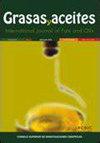Extraction of healthy oils from fish viscera by conventional and advanced technologies
IF 1
4区 农林科学
Q4 CHEMISTRY, APPLIED
引用次数: 0
Abstract
Fish viscera is a by-product of fish processing that has limited use as added-value products. The current issue of circular economy to produce recycled and zero waste products, therefore, the utilization of fish viscera for valuable products is important to explore. One of the valuable components of fish viscera is fish oil, which is characterized by being high in polyunsaturated fatty acids (PUFA). The limited exploration of fish viscera for potential utilization requires a comprehensive review of the visceral characteristics of various fish species. This article reviews the nutritional characteristics of various fish viscera, lipid class composition, fish viscera oil characteristics, and various methods of fish viscera oil extraction, both by conventional and advanced technologies. The main contribution of this review is to provide information about fish viscera, their potential as a source of fish oil, and extraction methods which are suitable for various industrial applications and purposes, including health applications for ω-3 fatty acids.用传统和先进技术从鱼类内脏中提取健康油脂
鱼内脏是鱼类加工过程中产生的副产品,作为增值产品的用途有限。当前的循环经济问题是生产可循环和零废物的产品,因此,探索利用鱼内脏生产有价值的产品非常重要。鱼内脏的宝贵成分之一是鱼油,其特点是富含多不饱和脂肪酸(PUFA)。由于对鱼类内脏潜在用途的探索有限,因此需要全面审查各种鱼类的内脏特征。本文综述了各种鱼类内脏的营养特点、脂质类别组成、鱼类内脏油的特点,以及通过传统和先进技术提取鱼类内脏油的各种方法。本综述的主要贡献是提供有关鱼类内脏、其作为鱼油来源的潜力以及适合各种工业应用和目的的提取方法的信息,包括ω-3 脂肪酸的健康应用。
本文章由计算机程序翻译,如有差异,请以英文原文为准。
求助全文
约1分钟内获得全文
求助全文
来源期刊

Grasas y Aceites
工程技术-食品科技
CiteScore
2.50
自引率
0.00%
发文量
50
审稿时长
3 months
期刊介绍:
Grasas y Aceites is a peer-reviewed journal devoted to the publication of original articles concerning the broad field of lipids, especially edible fats and oils from different origins, including non acyl lipids from microbial origin relevant to the food industry. It publishes full research articles, research notes, reviews as well as information on references, patents, and books.
Grasas y Aceites publishes original articles on basic or practical research, as well as review articles on lipid related topics in food science and technology, biology, (bio)chemistry, medical science, nutrition, (bio)technology, processing and engineering. Topics at the interface of basic research and applications are encouraged. Manuscripts related to by-products from the oil industry and the handling and treatment of the wastewaters are also welcomed.
Topics of special interest to Grasas y Aceites are:
-Lipid analysis, including sensory analysis
-Oleochemistry, including lipase modified lipids
-Biochemistry and molecular biology of lipids, including genetically modified oil crops and micro-organisms
-Lipids in health and disease, including functional foods and clinical studies
-Technical aspects of oil extraction and refining
-Processing and storage of oleaginous fruit, especially olive pickling
-Agricultural practices in oil crops, when affecting oil yield or quality
 求助内容:
求助内容: 应助结果提醒方式:
应助结果提醒方式:


